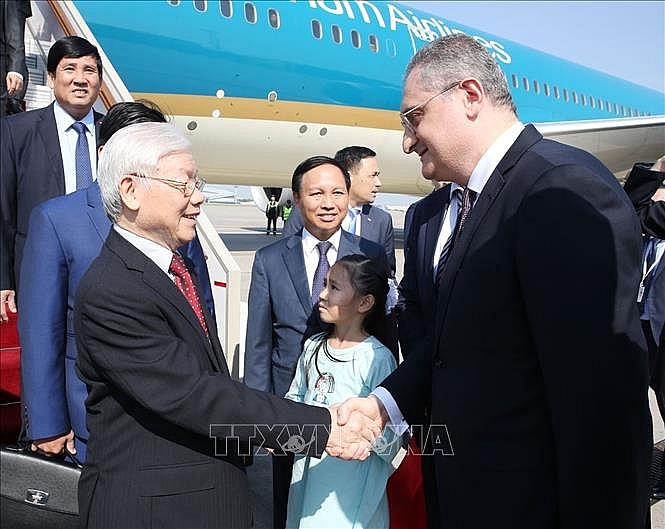Vietnam will further cement its relations with Russia
 |
| Vietnam will further cement its relations with Russia, photo: VNA |
It is expected that Party General Secretary Nguyen Phu Trong will pay an official visit to Russia in the time to come. The visit, the Party chief’s second to Russia, is aimed at creating positive co-operative momentum in all sectors, especially the economic, trade, and investment fields, expanding the market share of Vietnamese goods in Russia.
It is expected that in addition to meeting with Russian leaders, Party General Secretary Trong will also meet with leaders of Russia’s oil and gas groups and visit the economic special zone of Kaluga oblast, where he will also likely attend the ground-breaking ceremony of Vietnamese TH Group’s high-tech concentrated dairy and fresh milk production project.
According to Russia’s Presidential Executive Office’s Information Office, an agreement has been reached by Vietnam and Russia on more than 20 major joint investment programmes worth a total of around $10 billion.
Vietnam and Russia have agreed to continue deepening their co-operation in oil refining, petrochemicals, and production and sale of gas engine fuel on the Vietnamese market. Russia will also supply liquefied natural gas to the Vietnamese market. In addition, the Russian-Vietnamese Investment Fund (RFPI) plans to invest up to $500 million in promising non-commodities projects, above all in pharmaceuticals and agriculture.
According to Russian President Vladimir Putin, there are many possibilities for the two countries to boost co-operation in the electricity sector. “A Russian company, Siloviye Mashiny, is already building the Long Phu 1 thermal power plant in Vietnam. Our companies are ready to take part in modernising facilities built during the Soviet period and to build new facilities,” President Putin said.
He added that the oil and gas sector remains a priority co-operation area. The joint venture Vietsovpetro accounts for around a third of oil production in Vietnam. The number of actors taking part in this co-operation continues to grow.
“Russian companies Rosneft and Gazprom have started working on developing Vietnam’s continental shelf. In Russia, our companies are working with their Vietnamese colleagues to develop fields in the Nenets Autonomous Area, on the Yamal Peninsula, and in the Orenburg region,” he said.
The two countries will also jointly implement projects to assemble Russian GAZ, KAMAZ, and UAZ vehicles in Vietnam. In addition, Mosmetrostroy and Russian Railways are ready to take part in building metro systems in Hanoi and Ho Chi Minh City and in modernising Vietnam’s railway network.
Nearly two weeks ago, Chairman of the Danang People’s Committee Huynh Duc Tho travelled to Russia to meet with GAZ Group, one of Russia’s largest truck manufacturers, to discuss a project to develop an assembly and manufacturing factory for its vehicles in the central city. A GAZ leader will visit Danang this December.
“Russia is expanding its investment presence in Vietnam. Thus, we have begun implementing a bilateral deal on constructing automobile manufacturing and assembly plants in Vietnam with famous Russian brands like KAMAZ and GAZ. Hopefully, in the near future, these automobiles will approach the majority of Vietnamese consumers,” Russia’s Ambassador to Vietnam, K.V. Vnukov, told VIR.
As of August 20, Russia had 117 investment projects in Vietnam, registered at $931.6 million.
Meanwhile, Vietnam has 13 projects worth about $3 billion in Russia. The largest projects include oil and gas joint ventures Rusvietpetro and Gazpromviet, the Hanoi-Moscow multi-functional cultural and business centre, and the TH agricultural-industrial complex in Moscow, Kaluga, Primorsky, and Bashkortostan. Notably, TH Group inked a deal worth over $630 million with RFPI in May 2018 in order to produce fresh milk in Russia.
After the free trade agreement between Vietnam and the Eurasian Economic Union took effect in October 2016, the bilateral trade turnover between the two nations has soared annually by an average 30 per cent, reaching $3.55 billion last year.
What the stars mean:
★ Poor ★ ★ Promising ★★★ Good ★★★★ Very good ★★★★★ Exceptional
 Tag:
Tag:
Related Contents
Latest News
More News
- EU and Vietnam elevate relations to a comprehensive strategic partnership (January 29, 2026 | 15:22)
- Vietnam to lead trade growth in ASEAN (January 29, 2026 | 15:08)
- Japanese business outlook in Vietnam turns more optimistic (January 28, 2026 | 09:54)
- Foreign leaders extend congratulations to Party General Secretary To Lam (January 25, 2026 | 10:01)
- 14th National Party Congress wraps up with success (January 25, 2026 | 09:49)
- Congratulations from VFF Central Committee's int’l partners to 14th National Party Congress (January 25, 2026 | 09:46)
- 14th Party Central Committee unanimously elects To Lam as General Secretary (January 23, 2026 | 16:22)
- Worldwide congratulations underscore confidence in Vietnam’s 14th Party Congress (January 23, 2026 | 09:02)
- Political parties, organisations, int’l friends send congratulations to 14th National Party Congress (January 22, 2026 | 09:33)
- Press release on second working day of 14th National Party Congress (January 22, 2026 | 09:19)






















 Mobile Version
Mobile Version